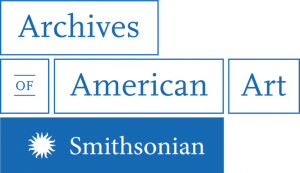Welcome to Conversations across Collections. This entry is the third in a collaborative series between the Archives of American Art and Crystal Bridges where we share the archival backstory on objects from each of our collections. In this blog, Meg Burns, Havner curatorial intern, reflects on the provenance of Marisol’s work The Bathers, utilizing archives from the Stable Gallery. Once you’ve read this story, hop over to the Archives of American Art, and learn more about Marisol’s life through letters and interviews.
One of my jobs as an intern is to help build object files—internal files for the museum and visiting researchers that include all the information about an object in our collection. How was the work created? Where has it been exhibited? Who previously owned the object?
My first research assignment was The Bathers, a 1961-62 work by sculptor Marisol that features three women lounging against a vivid blue backdrop. Marisol’s signature style combines 3D sculpture with assemblage, drawing, and painting. Marisol has added to the art historical trope of bathing nudes—a subject for artists from Titian to Cézanne—but in her own Pop-influenced style, complete with 1960s bikinis and a bright, unapologetic color palette.
The Stable Gallery Archives
When Marisol created The Bathers, she was represented by the Stable Gallery in New York City. Run by gallerist Eleanor Ward, the Stable Gallery gathered and supported mid-century avant-garde artists, including Andy Warhol, Joan Mitchell, and Isamu Noguchi. Upon her death, Eleanor Ward donated many of the Stable Gallery’s records to the Archives of American Art. Most of the documents in the Stable Gallery archives have been uploaded and are available for public view. Let me tell you, for a researcher, there may be no sweeter phrase than “the bulk of this series has been scanned.”
Newspaper clippings, correspondence, and sales receipts from the Stable Gallery archives related to Marisol’s work have been compiled, scanned, and uploaded, allowing me to piece together the life of The Bathers. Checklists tell us that The Bathers was exhibited in Marisol’s 1962 solo show at the Stable Gallery. This exhibition brought Marisol wide acclaim and significant collectors and museums acquired pieces for their collections like the Albright-Knox Gallery in Buffalo, NY, Roy Neuberger, and the Museum of Modern Art (MoMA).
A receipt from the gallery shows that William and Peggy Burden purchased The Bathers along with Person with Poodle in 1963. William Burden was president of MoMA at the time and The Bathers was featured in MoMA’s exhibition Americans 63 later that same year. Today, you can find The Bathers in the Early American Art Gallery at Crystal Bridges.
There’s More to the Story
Want to learn more about Marisol? Read the Archives of American Art blog about the sculptor’s life through letters and interviews.
This post was written by Meg Burns, Havner curatorial intern.
Special thanks to:








